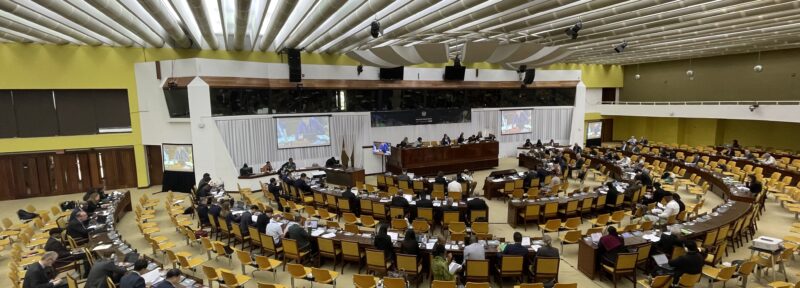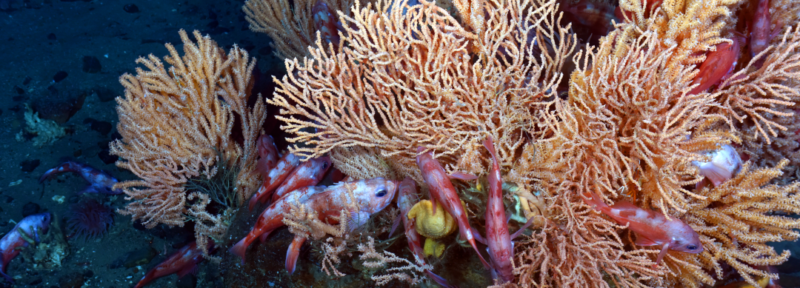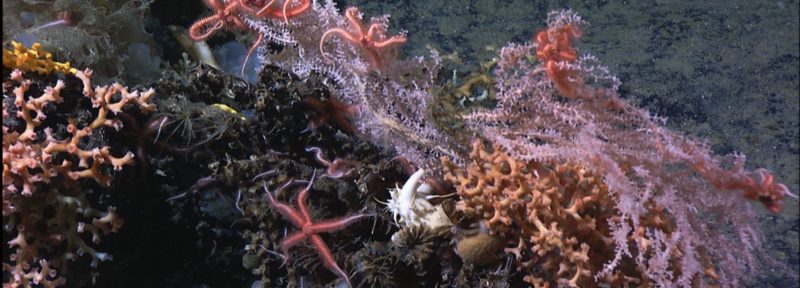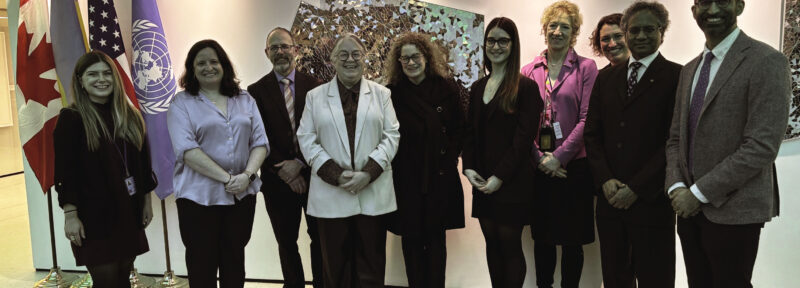Who Benefits from Deep-Sea Mining?
A demonstration to stop deep-sea mining in Kingston, Jamaica.
Credit: Nicole Zanesco
At approximately 10:30 a.m. on November 1, 1967, the future of ocean governance changed forever. Arvid Pardo, the permanent representative to the United Nations from Malta, made a speech to the General Assembly in New York City, asking member states to consider what the world could look like if we had collective responsibility for the ocean and its resources. What could humanity achieve if these were a global common and used for peaceful purposes?
His proposal—an international governance structure for the high seas—was met with suspicion and uncertainty. It required expanding international law in an unprecedented way and forcing states to balance “Freedom of the High Seas,” which allows states unhindered navigation of the high seas as well as access to fish stocks and ability to perform scientific research, with the notion of the “Common Heritage of Mankind”—a relinquishment of economic possibilities that made many states uncomfortable. Pardo’s dream ultimately prevailed and the United Nations Convention of the Law of the Sea (UNCLOS) was drafted and came into force. In the decades since, a network of treaties and governance bodies, both under UNCLOS and adjacent to it, have emerged to regulate and protect the international ocean. However, the fundamental tension between unbridled exploitation and collective, responsible management lives on, and the battle now continues in the deep sea.
Three times a year I attend the meetings of the International Seabed Authority (ISA), a body born from Pardo’s revolutionary idea that exists within the UNCLOS legal framework. In 1967, Pardo looked at the minerals found on the international seabed and posited that, instead of being swept up in a free-for-all and used for military purposes, these resources could be set aside and used to benefit humanity, especially developing countries. As a result, the ISA was tasked with governing the international seabed for the benefit of humankind as a whole.
As you might expect, it is a herculean task to shape an international regulatory regime that could effectively govern a largely speculative industry in a part of the planet we still know very little about. For many years the ISA attempted to do so, operating in obscurity, before the Republic of Nauru, partnered with Canadian mining company The Metals Company, triggered a legal loophole during the COVID-19 pandemic to accelerate negotiations. Under pressure from mining companies, a few states, and the ISA Secretary-General himself, representatives from countries are now caught between pushing to fast-track an insufficient set of rules and trying to prevent mining from proceeding at all.
At issue is a fundamental disagreement about what “the benefit of humankind” means more than five decades later. For some at these meetings, governing the seabed means enabling deep-sea mining as soon as possible—even if it is unregulated or poorly regulated. However, since 1967, we have learned so much about the ocean, the environment, and energy technologies. At the time, there was no knowledge of the potentially devastating impacts deep-sea mining will have on some of the last intact ocean ecosystems, nor was climate change threatening to reshape the world. We are living in a fundamentally different time and our institutions must be able to evolve to respond to new challenges. That means asking some difficult questions about the ISA and its role. Is mining one of our last untouched ecosystems going to benefit humankind? Is the ISA prepared to regulate what could be the largest extractive industry on the planet? And as we face climate change and the biodiversity crisis, can we justify destroying a habitat we know little about and that will never recover?
With each passing ISA meeting, it becomes clearer that the answer in each case is no. At the two most recent meetings (July and November 2023), states once again failed to reach agreement on critical issues. These include a finance mechanism for benefit sharing, environmental impact assessment regulations, a compliance and enforcement mechanism to ensure the rules are followed, as well as the much more fundamental issue of whether we should mine in the first place. Studies demonstrate that money generated by DSM will not be sufficient to support the ISA’s operational costs and provide compensation to member states. Moreover, as the prices of the metals found in the deep sea decrease and companies move towards new battery technologies, there are doubts over both the need for these metals and the potential windfall. These concerns are in addition to the science telling us DSM will cause irreversible harm to the marine environment. If DSM won’t benefit humanity, isn’t pursuing mining anyway undermining Pardo’s vision and UNCLOS itself?
Although Pardo’s plan for the Common Heritage of Humankind prevailed, he was not happy with the final modifications to UNCLOS. He considered the end result “the most inequitable treaty that has ever been signed in the world,” citing concerns that his idea for the Common Heritage of Humankind was being used to enable rampant exploitation of common space and resources. Decades later, as a showdown between mining and conservation rocks the ISA, these concerns are being vindicated.
By continuing to focus single-mindedly on advancing mining in the face of growing opposition and disagreement, the ISA is overlooking the many ways it could change and respond to the crises of the 21st century while remaining true to Pardo’s vision. Instead of mining the seabed, the ISA could manage seabed resources for the benefit of humankind through scientific research, capacity building and technology transfer, and by investigating and managing marine genetic resources from the deep sea.
Over twenty countries, dozens of companies, and over one hundred civil society groups from around the world are calling on the ISA to adopt a moratorium on deep sea mining in international waters. The metals found in the seabed are the Common Heritage of Humankind; thus, any extraction of those metals should be done with the consent of humankind and with the assurance that it will benefit them. And though it might not have occurred to previous generations, perhaps the best way the deep sea can benefit humanity is by existing, largely untouched, into the future—a world filled with wonders for our descendants to discover and understand.
Nicole Zanesco is Oceans North’s international policy advisor.





